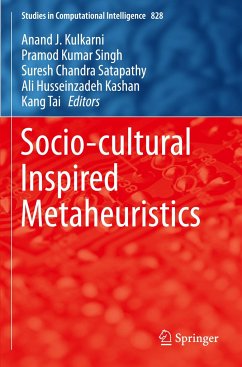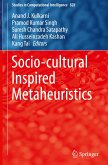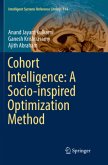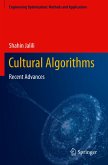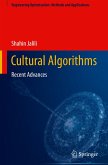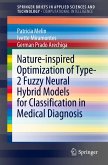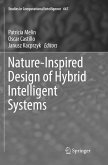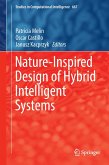Socio-cultural Inspired Metaheuristics
Herausgegeben:Kulkarni, Anand J.; Singh, Pramod Kumar; Satapathy, Suresh Chandra; Husseinzadeh Kashan, Ali; Tai, Kang
Socio-cultural Inspired Metaheuristics
Herausgegeben:Kulkarni, Anand J.; Singh, Pramod Kumar; Satapathy, Suresh Chandra; Husseinzadeh Kashan, Ali; Tai, Kang
- Broschiertes Buch
- Merkliste
- Auf die Merkliste
- Bewerten Bewerten
- Teilen
- Produkt teilen
- Produkterinnerung
- Produkterinnerung
This book presents the latest insights and developments in the field of socio-cultural inspired algorithms. Akin to evolutionary and swarm-based optimization algorithms, socio-cultural algorithms belong to the category of metaheuristics (problem-independent computational methods) and are inspired by natural and social tendencies observed in humans by which they learn from one another through social interactions. This book is an interesting read for engineers, scientists, and students studying/working in the optimization, evolutionary computation, artificial intelligence (AI) and computational intelligence fields.…mehr
Andere Kunden interessierten sich auch für
![Socio-cultural Inspired Metaheuristics Socio-cultural Inspired Metaheuristics]() Socio-cultural Inspired Metaheuristics75,99 €
Socio-cultural Inspired Metaheuristics75,99 €![Cohort Intelligence: A Socio-inspired Optimization Method Cohort Intelligence: A Socio-inspired Optimization Method]() Anand Jayant KulkarniCohort Intelligence: A Socio-inspired Optimization Method75,99 €
Anand Jayant KulkarniCohort Intelligence: A Socio-inspired Optimization Method75,99 €![Cultural Algorithms Cultural Algorithms]() Shahin JaliliCultural Algorithms127,99 €
Shahin JaliliCultural Algorithms127,99 €![Cultural Algorithms Cultural Algorithms]() Shahin JaliliCultural Algorithms127,99 €
Shahin JaliliCultural Algorithms127,99 €![Nature-inspired Optimization of Type-2 Fuzzy Neural Hybrid Models for Classification in Medical Diagnosis Nature-inspired Optimization of Type-2 Fuzzy Neural Hybrid Models for Classification in Medical Diagnosis]() Patricia MelinNature-inspired Optimization of Type-2 Fuzzy Neural Hybrid Models for Classification in Medical Diagnosis38,99 €
Patricia MelinNature-inspired Optimization of Type-2 Fuzzy Neural Hybrid Models for Classification in Medical Diagnosis38,99 €![Nature-Inspired Design of Hybrid Intelligent Systems Nature-Inspired Design of Hybrid Intelligent Systems]() Nature-Inspired Design of Hybrid Intelligent Systems150,99 €
Nature-Inspired Design of Hybrid Intelligent Systems150,99 €![Nature-Inspired Design of Hybrid Intelligent Systems Nature-Inspired Design of Hybrid Intelligent Systems]() Nature-Inspired Design of Hybrid Intelligent Systems150,99 €
Nature-Inspired Design of Hybrid Intelligent Systems150,99 €-
-
-
This book presents the latest insights and developments in the field of socio-cultural inspired algorithms. Akin to evolutionary and swarm-based optimization algorithms, socio-cultural algorithms belong to the category of metaheuristics (problem-independent computational methods) and are inspired by natural and social tendencies observed in humans by which they learn from one another through social interactions. This book is an interesting read for engineers, scientists, and students studying/working in the optimization, evolutionary computation, artificial intelligence (AI) and computational intelligence fields.
Produktdetails
- Produktdetails
- Studies in Computational Intelligence 828
- Verlag: Springer / Springer Nature Singapore / Springer, Berlin
- Artikelnr. des Verlages: 978-981-13-6571-3
- 1st edition 2019
- Seitenzahl: 316
- Erscheinungstermin: 29. Oktober 2020
- Englisch
- Abmessung: 235mm x 155mm x 18mm
- Gewicht: 463g
- ISBN-13: 9789811365713
- ISBN-10: 9811365717
- Artikelnr.: 59795598
- Herstellerkennzeichnung
- Springer-Verlag GmbH
- Tiergartenstr. 17
- 69121 Heidelberg
- ProductSafety@springernature.com
- Studies in Computational Intelligence 828
- Verlag: Springer / Springer Nature Singapore / Springer, Berlin
- Artikelnr. des Verlages: 978-981-13-6571-3
- 1st edition 2019
- Seitenzahl: 316
- Erscheinungstermin: 29. Oktober 2020
- Englisch
- Abmessung: 235mm x 155mm x 18mm
- Gewicht: 463g
- ISBN-13: 9789811365713
- ISBN-10: 9811365717
- Artikelnr.: 59795598
- Herstellerkennzeichnung
- Springer-Verlag GmbH
- Tiergartenstr. 17
- 69121 Heidelberg
- ProductSafety@springernature.com
Anand J. Kulkarni holds a Ph.D. in Distributed Optimization from Nanyang Technological University, Singapore, M.S. in AI from the University of Regina, Canada, and Bachelor of Engineering from Shivaji University, India. He worked as a Research Fellow on a cross-border supply-chain disruption project at Odette School of Business, University of Windsor, Canada. Currently, he is working as Head and Associate Professor at the Symbiosis Institute of Technology, Pune, India. His research interests include optimization algorithms, multi-objective optimization, multi-agent systems, complex systems, swarm optimization, game theory and self-organizing systems. He is the founder and chairman of the OAT Research Lab. Anand has published over 40 research papers in peer-reviewed journals and conferences along with two books. Pramod Kumar Singh is an Associate Professor in Information and Communication Technology at the ABV-Indian Institute of Information Technology and Management, Gwalior, India. He completed his B. Tech. from the Kamla Nehru Institute of Technology, Sultanpur, UP, India, and M. Tech. and Ph.D. from the Indian Institute of Technology, Kharagpur, India. His research interest includes computational intelligence, multi-objective optimization, data mining, text analytics, and machine learning. He is member of IEEE and ACM. He has been Associate Editor of IJSI and Guest Editor of JOCS. Besides, he is on the reviewer board of various reputed journals published by IEEE (including Transactions), Elsevier, Springer, ACM, and Taylor and Francis. He has published more than 70 research papers in various international journals and conferences. Suresh Chandra Satapathy is a Professor at the School of Computer Engineering, KIIT, Odisha, India. Previously, he was a Professor and Head of the Department of CSE at ANITS, AP, India. He received his Ph.D. in CSE from JNTU, Hyderabad and M.Tech. in CSE from the NIT, Odisha. He has more than 27 years of teaching and research experience. His research interests include machine learning, data mining, swarm intelligence and applications. He has published more than 98 papers in respected journals and conferences and has edited numerous volumes for Springer AISC and LNCS. In addition to serving on the editorial board of several journals, he is a senior member of the IEEE and a life member of the Computer Society of India, where he is the National Chairman of Division-V (Education and Research). Ali Husseinzadeh Kashan completed his Ph.D. and postdoc in Industrial Engineering at Amirkabir University of Technology, Iran. Currently, he is an Associate Professor at the Department of ISE, Tarbiat Modares University, Iran. He received an 'Outstanding Young Scientist of Industrial Engineering' award from the Academy of Sciences of the Islamic Republic of Iran in 2016, and has been awarded honors for his research by various academic associations in Iran. His research interests include mathematical modelling and algorithms, computational intelligence and engineering design with nature-inspired optimization and simulation-based optimization. Dr. Kashan has published over 70 research papers in peer-reviewed journals and conferences and has served as a reviewer for several outstanding journals such as: IEEE Transactions on Evolutionary Computations, Omega, Computers & Operations Research, Journal of the Operational Research Society, Computers & Industrial Engineering, and International Journal of Production Research. Kang Tai obtained his B.Eng. (1st Class Honors) in Mechanical Engineering from the NUS in 1990. In 1992 he was awarded the NTU Singapore Overseas Scholarship to pursue his Ph.D. at the Imperial College of Science, Technology and Medicine London, after which he returned to NTU in 1995 and he is currently an Associate Professor there. From 2001 to 2004 he was also concurrently appointed as a Faculty Fellow of the Singapore-MIT Alliance. He teaches various UG and PG courses. His research interests include design automation, optimization, evolutionary algorithms, computational geometry, system identification and mathematical modeling of industrial processes. He has also published more than 70 research papers.
Optimum Design of Four Mechanical Elements Using Cohort Intelligence Algorithm.- Premier League Championship Algorithm: a multi-population based Algorithm and its Application on Structural Design Optimization.- Socio-inspired Optimization Metaheuristics: A Review.- Social Group Optimization Algorithm for Pattern Optimization in Antenna Arrays.- A Self-organizing Multi-agent Cooperative Robotic System: An Application of Cohort Intelligence Algorithm.- Feature Selection for Vocal Segmentation Using Social Emotional Optimization Algorithm.- Simultaneous Size and Shape Optimization of Dome-shaped Structures Using Improved Cultural Algorithm.- A Socio-Based Cohort Intelligence Algorithm for Integer Discrete and Mixed Design Variables Engineering Problems.- Maximizing Profits in Crop Planning Using Socio Evolution and Learning Optimization.- Application of Cohort- intelligence Variations Designing Fractional PID Controller for Various Systems.
Optimum Design of Four Mechanical Elements Using Cohort Intelligence Algorithm.- Premier League Championship Algorithm: a multi-population based Algorithm and its Application on Structural Design Optimization.- Socio-inspired Optimization Metaheuristics: A Review.- Social Group Optimization Algorithm for Pattern Optimization in Antenna Arrays.- A Self-organizing Multi-agent Cooperative Robotic System: An Application of Cohort Intelligence Algorithm.- Feature Selection for Vocal Segmentation Using Social Emotional Optimization Algorithm.- Simultaneous Size and Shape Optimization of Dome-shaped Structures Using Improved Cultural Algorithm.- A Socio-Based Cohort Intelligence Algorithm for Integer Discrete and Mixed Design Variables Engineering Problems.- Maximizing Profits in Crop Planning Using Socio Evolution and Learning Optimization.- Application of Cohort- intelligence Variations Designing Fractional PID Controller for Various Systems.

